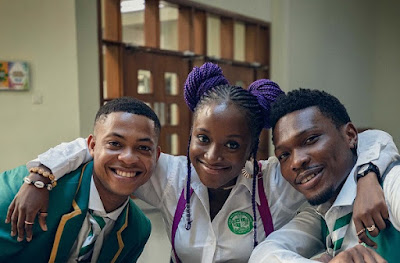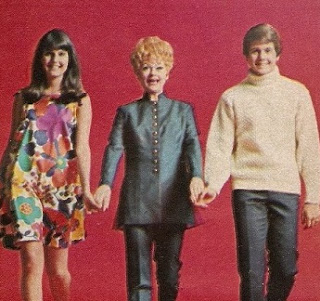This morning Netflix pushed a Nollywood tv series at me, Far From Home: a poor boy gets a scholarship to an exclusive private school "for the 1%," where posters advertise Chess Club and Choir. The promo shows the poor boy walking into class: a Femme Boy smiles at him, an Arrogant Jock glares at him, a Mean Girl sizes him up, and a Nice Girl helps him tie his tie. Wait -- Nigeria is one of the most homophobic countries on Earth. There can't be a gay character -- can there? I'm reviewing the first episode to find out.
Scene 1: Ishaya's first art exhibition (all black-and-white portraits of expressive faces), treated like the Oscars, with paparazzi and fans clicking away as he walks up the red carpet. He adulates himself: "Who would have thought that the dreams of a young boy from Lagos would come true?"
Obviously this is a dream. Ishaya (Mike Afolarin) awakens late for work. Nice beefcake shot as he rushes to get dressed.
Scene 2: Ishaya at his job cleaning a rich guy's house. The rich guy clomps on his cleaning supplies; the teenage son throws a plate at him derisively. After work, he tries to sell his painting on the street, but the rich people sneer at him.
Scene 3: Back in his horrible hovel. Ishaya's friend Michael (Moshood Fattah) wants to know why he needs money so badly: "I won a fellowship to study in London with the famous artist Essein, and I need to raise money for air fare." Suddenly he remembers that he has to buy the cake for his sister's birthday party, and runs out.
Left: during Pride Month, Moshood Fattah promotes the use of PrEP on his instagram page. That's quite gay-friendly for Nigeria.
Scene 4: The party is for Ishaya's sister Rahila, but the guests consist of Michael, Ishaya's girlfriend, and the parents. They play cards and watch an advert for Wilmer Academy, the best school in Nigeria. Rahila wants to go to the Open Exam Day to try out for a scholarship, but Mom forbids it.
Scene 5: Ishaya offers to sneak his sister into the Open Exam. On the ritzy grounds of the Academy, they almost get smushed by a car. The passenger calls them "gutter-trash" and yells "You don't belong here!" I can't tell that they are poor by looking. Maybe in Nigeria you can.
Ulp, the registration fee is 150,000 naira ($336)! They are shocked. "Aren't scholarships supposed to help people who can't afford extravagant fees?" "This is Wilmer Academy, you gutter trash!" They slink out. Next up: the guy who yelled from his car, and his surly Arrogant Jock son Denrele (Raymond Umenze, left, the one in drag).
Scene 6: Ishaya offers to help her get the money, but Rahila has given up: "Having dreams only leads to disaster. Dad wanted to become an artist, and it cost us our brother's life." I want to know more about that back story!
Cut to Ishaya's evening job as a waiter at a nightclub where men squeal as women's butts gyrate in their faces (three times!). His uniform is sleeveless -- so men can gaze at his muscular arms after they finish with the butts? On to his day job cleaning houses. And his side job painting portraits. (Nice chest shot as he changes clothes.)
Scene 7: Government, the manager of the butt-gyrating club, slams someone for stealing drugs from his stash, and then feeds him to his pet hyena. Ishaya comes in to ask for his paycheck.
Scene 8: Ishaya is still intent on going to London. Girlfriend finds out that he was planning behind her back, dumps him, and starts dating one of the nightclub guys. He roils with jealousy. Plus the travel agent needs the full 300,000 naira fee now. He can't go.
Scene 9: At the nightclub, a customer asks for some bills to shove up ladies' butts. Ishaya goes into the money room to fetch some -- and steals 150,000 naira! Not enough to pay the travel agent, but enough for the Open Scholarship exam, and since his sister is no longer interested....
Scene 10: Ishaya pays the fee, and memorizes the test answers in advance, so he's sure to get in. Hey, that's cheating!
Scene 11: First day of school. At the assembly, Ishaya sits in the only available seat, next to smiling Femme Guy (Emeka Nwagbaraocha).
Carmen, the great-granddaughter of the founder of the school, gives a speech. "That babe is fine!" he exclaims. Femme Guy Frank: "Sorry, I can't see it." Did you just come out to a stranger? In Nigeria?
Ishaya is introduced as a scholarship boy who got 100% on the exam. Everyone wants to get a photo of him.
Scene 12: After the assembly, Femme Guy is buddying up to Ishaya, when a Femme Adult named Atlas (Olumide Oworu) gushes over: "Frankincense, is that you?" "My name is Frank now." Arrogant Jock pulls him away. I don't understand. Has Frank turned straight, and rejects people from his old life?
Time for a campus tour. When they visit the school's art gallery, Ishaya flashes back to telling his father that he wants to become an artist. "Art is not permitted in this house!" Dad yells. "It killed your brother!"
Scene 13: Principal tells Ishaya that they need the transcript from his old school. "Gulp...um...er...old school?"
Meanwhile, Arrogant Jock's Dad is yelling at him for not cheating on the scholarship exam. "Now the gutter trash who cleans our house won the scholarship!" I wanted to do it on my own." "You're an idiot if you think anything can be achieved honestly in this world."
Scene 14: Ishaya needs 50,000 naira ($112) to buy a fake transcript. His friend Michael gives it to him.
Meanwhile, Femme Adult Atlas arrives at Carmen's mansion. He calls his Mum to ask her to pay the school fees, so he won't be kicked out (ok, he's a student.) and can apply to the London Art Institute. Is everybody at this school an aspiring artist? Her assistant blows him off: "Your mother is still in Paris. She'll call when she returns."
Scene 15: While Atlas chats about art with her parents, Carmen is searching frantically through her room. She orders the maid to fetch Mum: "Give it to me!" "You don't need any more painkillers Your leg is fine." Uh-oh, Carmen has a drug problem.
Femme Student Atlas and Girl-of-Dreams Carmen head to the car. She complains: "It feels like I have no control over my life. I can't wait for us to move to London." He hugs and kisses her -- a femme boyfriend! I knew he couldn't be gay.
Atlas is so angry about his mother that he drives erratically. Carmen flashes back to the car accident a year ago that squashed her leg, and shrieks for him to stop the car.
Scene 16: Ishaya delivers the fake transcript to the Principal. "Great, now we just need to call your old school to verify it." "Um...er....um..verify it?" He desperately calls his friend Michael to ask him to pretend to be a school official.
Meanwhile, Atlas and Carmen arrive at school, and are greeted by another power couple, Reggie (Natse Jemide) and Nen. They go to "the shrine," a single-person restroom with a door that locks, where they can smoke marijuana. Carmen wants to know why they've been ghosting her for months. "We're like...um...busy."
Scene 17: Ishaya rushes into the bathroom, changes into his school uniform, and rushes into class late. This is the scene in the promo, with Arrogant Jock glaring, Femme Guy Frank smiling, and a purple-haired girl helping him adjust his tie.
After class, Purple-Haired Girl, Zinna, asks if he likes Carmen, since he drew a portrait of her in his notebook. Arrogant Jock introduces himself, but she snubs him to flirt with Femme Guy Frank. He is thrilled. I knew he couldn't be gay.
Scene 18: Art class. Ishaya is busily drawing instead of listening to the lecture, so the teacher confiscates his notebook. "This year the three best students will be permitted to apply for the London Art Institute Grant." A grant to get into the school, and now a grant to go to another school. Aren't these rich kids who don't need grants?
Scene 19: Ishaya in the Bursar's Office, getting his grant money. After subtracting the cost of his school uniform and textbooks, he gets 5,000 naira ($11.00). Even in Nigeria, you can't survive on that! He rushes into the bathroom and takes off his shirt and cries.
Scene 20: Back home, the manager of the butt-gyrating club has taken Ishaya's family hostage. He wants to know why Ishaya stole 150,000 naira from him. "You have one week to pay me back, or your sister will become one of my prostitutes. We'll take her now, to save time."
They leave. Dad, understandably upset, kicks Ishaya out of the house. The end.
Beefcake: Ishaya, frequently.
Other Sights: Lots of establishing shots of Lagos.
Heterosexism: Atlas-Carmen-Ishaya, and I think the Surly Jock is into her, too. Everyone else pairs off into boy-girl couples.
Gay Characters: Frank has a gay-subtext romance with Ishaya, but he's mostly busy fallin gin love with his sister. Feminine appears to signify "rich" rather than "gay" in Nigerian culture. The "frankincense" line was just an all-purpose insult.
My Grade: Ishaya comes across as a jerk: "I really want to become an artist" is no excuse for stealing, cheating, and (later on) helping your boss kidnap your best friend. But the juxtaposition of the "who's dating who?" teen angst and the "feed him to my hyena" mob plotlines makes for an interesting drama. And there is A LOT of beefcake. B

.jpg)
.jpg)















